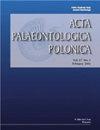The tarphyceratid cephalopod Trocholites in the Middle-Late Ordovician of the Prague Basin – the Baltican element in peri-Gondwana
IF 1.9
3区 地球科学
Q2 PALEONTOLOGY
引用次数: 0
Abstract
. The tarphyceratid cephalopod Trocholites in the Middle –Upper Ordo-vician of the Prague Basin—the Baltican element in peri-Gondwana. Acta Palaeontologica Polonica 68 (3): 529–538. The vast majority of cephalopods of the order Tarphyceratida are known from regions that were located at mid-or low palaeolatitudes during the Ordovician (mainly Baltica, Laurentia, and Chinese palaeoblocks). Only a handful of tarphy - ceratid specimens are known from high palaeolatitude regions of peri-Gondwana and Gondwana. Here, we describe the two best-preserved trocholitid cephalopods known to date from the Ordovician of the Prague Basin. The first is from the late Darriwilian/early Sandbian Dobrotivá Formation and is assigned to Trocholites fugax , a species previously recorded from roughly coeval strata of Iberia, France, and Bohemia. The specimen thus strengthens previous hypotheses regard - ing the interchange of non-benthic faunas between Baltica and different regions of peri-Gondwana during the Middle/ Late Ordovician boundary interval. The second specimen, assigned to a new species of Trocholites chaloupkai sp. nov., is from the late Sandbian–early Katian Zahořany Formation and thus represents one of the stratigraphically youngest Trocholites in the Ordovician of peri-Gondwana. Internal structures of the shell of the holotype of the new species were studied using micro-CT tomography. This revealed that T. chaloupkai sp. nov. closely resembles the stratigraphically older (Darriwilian) species Trocholites depressus from Estonia.布拉格盆地中晚奥陶世苔藓虫类头足类岩石——近冈瓦纳地区的波罗的海元素
本文章由计算机程序翻译,如有差异,请以英文原文为准。
求助全文
约1分钟内获得全文
求助全文
来源期刊

Acta Palaeontologica Polonica
地学-古生物学
CiteScore
2.80
自引率
5.60%
发文量
36
审稿时长
12.5 months
期刊介绍:
Acta Palaeontologica Polonica is an international quarterly journal publishing papers of general interest from all areas of paleontology. Since its founding by Roman Kozłowski in 1956, various currents of modern paleontology have been represented in the contents of the journal, especially those rooted in biologically oriented paleontology, an area he helped establish.
In-depth studies of all kinds of fossils, of the mode of life of ancient organisms and structure of their skeletons are welcome, as those offering stratigraphically ordered evidence of evolution. Work on vertebrates and applications of fossil evidence to developmental studies, both ontogeny and astogeny of clonal organisms, have a long tradition in our journal. Evolution of the biosphere and its ecosystems, as inferred from geochemical evidence, has also been the focus of studies published in the journal.
 求助内容:
求助内容: 应助结果提醒方式:
应助结果提醒方式:


